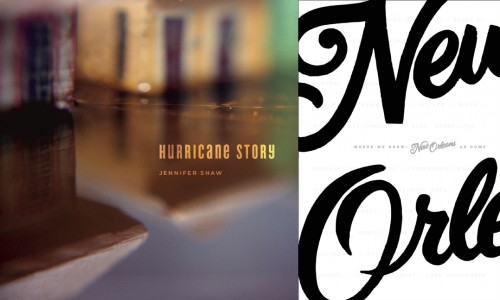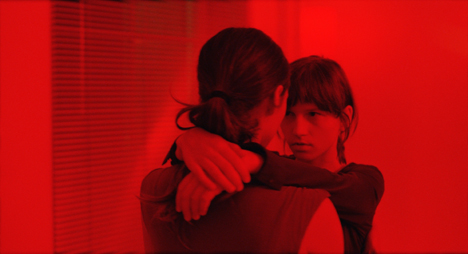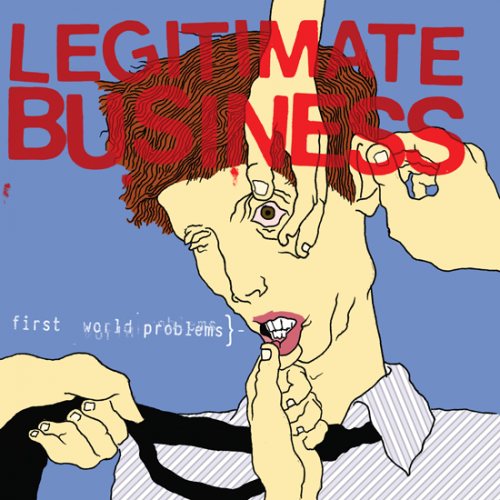Two New Books From Chin Music Press
Since I first discovered Chin Music Press, and their philosophical and elegant title Oh, I’ve been interested in the books they publish because each title is produced not only as a book but as a well-designed art object. Their books use high quality papers, sharp page design, and full color printing for images. This attention to detail makes reading their titles a truly sensual experience.
Broken Levee Books, a Chin Music imprint, has in recent months released two compelling books about New Orleans post-Katrina–Hurricane Story by Jennifer Shaw and Where We Know New Orleans as Home edited by David Rutledge.
Isn’t it time for Dusan Makavejev’s Sweet Movie (1974) to make a comeback, due to its name alone?
The Stats on Infinity
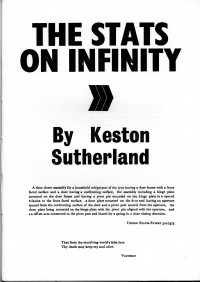 The Stats on Infinity
The Stats on Infinity
by Keston Sutherland
Crater Press, 2010
15 pages / Out of Print
Rating: 8.0
I don’t know how familiar readers of this site will be with the work of Keston Sutherland, the British experimental poet sometimes associated with the Cambridge and New York “LANGUAGE” schools of poetry (though Sutherland’s work squirms uneasily under any attempt at definition in terms of school/genre/whatever). Sutherland’s poetry is difficult. A video of Sutherland reading his long poem Hot White Andy is a good introduction to his work: intense, surging and bewildering. He looks manic as he reads; the text is plosive and works through him, as though it is spilling out of his body rather than his mind, like Lucky’s monologue in Waiting for Godot, or the frenetic mutterings of Not I.
September 20th, 2011 / 1:09 pm
A Giant Triangle of Anxiety: An Interview with Mark Leidner
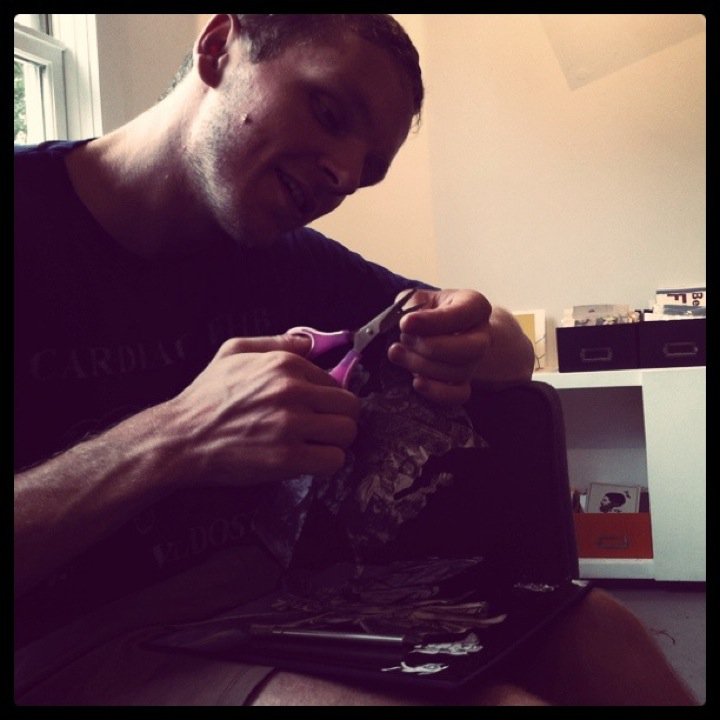
2011 has been a big year for Mark Leidner. Besides being one of the best things going on twitter, he’s also released two books: The Angel in the Dream of Our Hangover, a book of aphorisms from Sator Press; and Beauty Was The Case That They Gave Me, a book of poems from Factory Hollow Press. Each are singular in that they somehow manage to be both hilarious and uncannily gorgeous in their method of exploration, seeming to hyper-compress big ideas into forms that in lesser hands would seem absurd. Over the past couple weeks, Mark and I exchanged some emails about his books, sincerity, humor, religion, logic, and terror, among other things.
* * *
Butler: The Angel in the Dream of Our Hangover reads mostly like a book of aphorisms, which is an interesting format to take up. I think a lot of it reads as very sincere, even when it is using strange spins on the traditional aphorism, such as fatherfucker, or what some would consider “ridiculous imagery” such as punching water. I wonder if you knew you were writing a book of aphorisms, if you see it that way, and how this began to come together and form a book?
Leidner: I was trying to write aphorisms on purpose. The book didn’t begin that way though. Initial drafts contained more ironic or jokier stuff – the kind of thing that in the heat of the moment on Twitter can be exciting – which is how Ken Baumann the publisher first approached me – proposing a book that would begin as a carefully selected arrangement of tweets – but as the book grew, we felt the center start to cohere around the aphorism. A line like “what if hot dogs were the cut off horns of meat unicorns” can be interesting on Twitter because in Twitter it will burst into your feed like a surprise, it’ll be free, and there won’t by any high-minded literary expectation waiting for it in you. But copied & pasted into the literary form of the book and it becomes much more boring (at least to me) especially if it’s a book I’ve paid for, because while briefly interesting, its central juxtaposition doesn’t target anything I more than superficially care about. Great tweets give you a huge reward up front at the expense of lasting power. But a good aphorism rewards you more the more you think about it, partly because it is attached to some enduring concern. But that’s their downfall. Generalizing about grand themes is didactic – so the challenge of writing them in a way that honored complexity was very exciting, and pushed me into ridiculous imagery that felt both personal and universal. READ MORE >
On Using Hybrid Texts to Lead the Creative Writing Classroom: Some Notes Toward a Pedagogy
The poet doesn’t invent. He listens. ~ Jean Cocteau
Words are everything else in the world. ~ Wallace Stevens
In the Creative Writing classroom, I don’t teach so much as I lead. Discussions. Close-readings. Deep-readings. Free-writings. Whatever it is, I keep minds attuned to construction rather than destruction. Destruction is better left to the literature classroom, where it has its purpose, surely. We don’t read to answer what or who but rather why and how. We read widely, and we imitate shamelessly; we invent, therefore, with an existing form as backbone before we learn to invent forms of our own. We string words on the page like Christmas lights across the roof; we have purpose and design in mind, but mainly, we just want shit to glow brightly. The goal: limit the variables, at least at first. As we learn to construct within the preconceived frames, we increase the variables beyond simple imitation, and the possibilities to invent then grow considerably. We understand, ultimately, that poetry can exist in many physical shapes, and we strive to keep the language malleable within whatever shape it takes.
Ernie Els on Writing
Before we went out, I knew I had no chance.
I just got beat.
You’re trying to survive. It’s desperation… It’s sadistic. In a way it’s fun, if you’re into that shit.
I’m going to get on the airplane and have a couple of beers now.
You’re actually fucking yourself.
You’ve got to be ready for it. And it’s happening more often. I never knew about it, never thought about it, until it’s in your lap.
Last year’s Open probably took a month to get over that.
The timing is unfortunate.
There was a clause in my contract where I could get out, and I’m getting out.
It’s a bit crazy.
I knew we were all in trouble.
We don’t have much of a chance.
I was thinking of taking out a little frustration.
I’ve never seen that happen.
I get all kinds of people telling me I have the best swing in the world—it’s beautiful, it’s effortless. But I know when that isn’t true.
What the hell are you doing up?
I am currently taking submissions for feature reviews. Contact me for more info. Or maybe you’re interested in writing reviews in the future. Queries are welcome too.
A lot of very disorganized thoughts about being a writer
A few years ago, I had a student walk into my Intro to Women’s Studies class – late – on the very first day. She was a non-traditional student, probably older than me by ten years. As is expected for first day “ice breakers,” I asked my students why they were taking my class, what they thought feminism means, etc. This student offered to start the conversation. She asked: My religion tells me that I should submit to my husband, and I believe my religion. Can I still be a feminist?
I’d never been asked a question like that before, and it was jarring, sure, but I knew the answer: Yes, of course you can!
This is perhaps an odd way to begin a post about the “authenticity” of being a writer, and yet, it isn’t. A few weeks ago, someone commented that Starcherone wasn’t a “legit” publisher. A couple weeks ago, the BlazeVOX scandal hijacked the writer blogworld. The issue of legitimacy came up again and again. Last week, an anonymous blogger made the argument that I participate in some type of elite cronyism because I said I don’t like to submit to journals. All of these events circle around the question of legitimacy and authenticity. And I wonder: what the fuck does it really matter?


